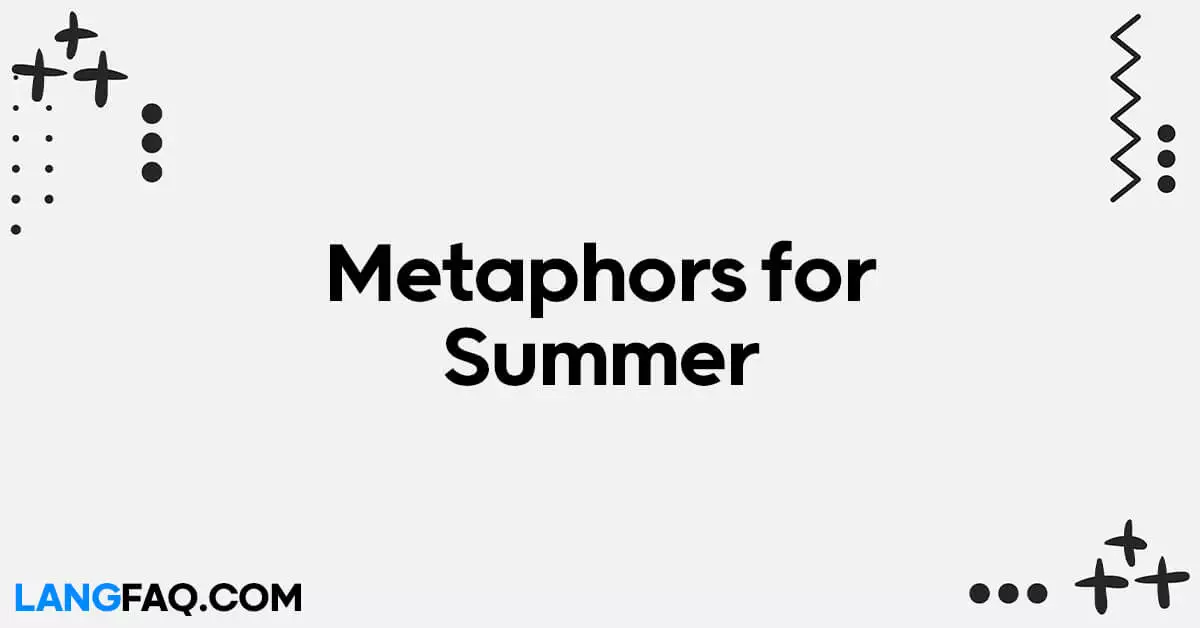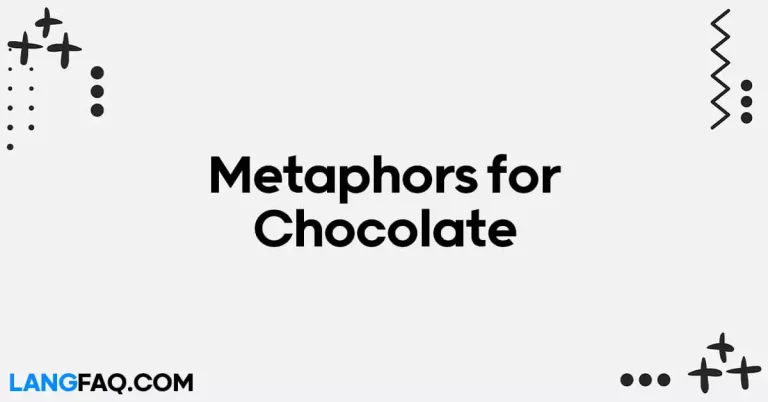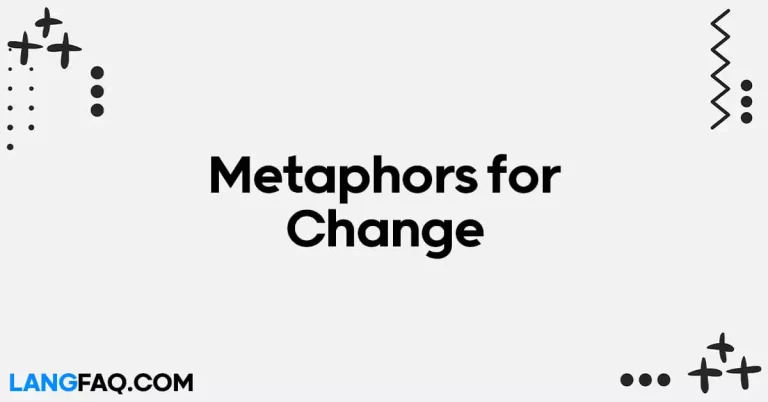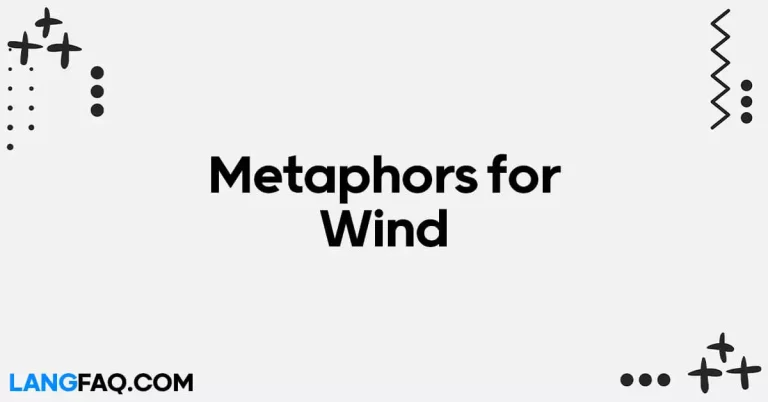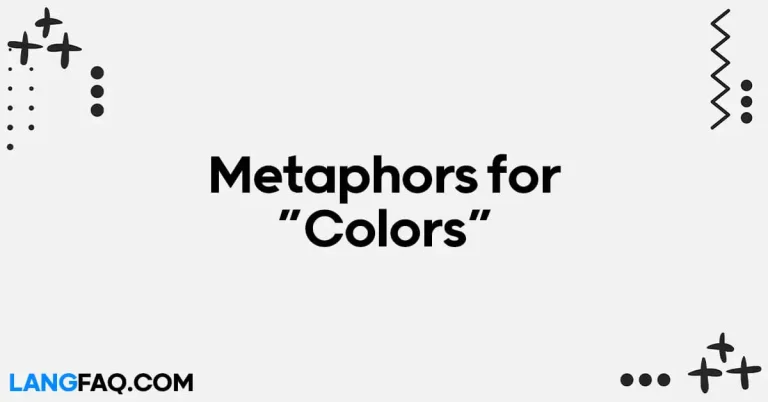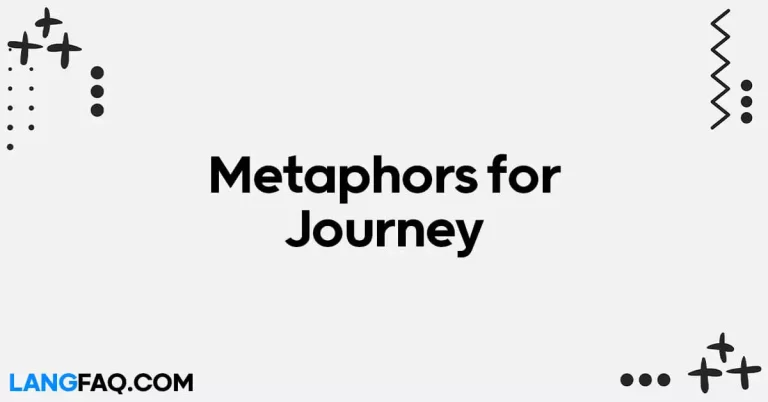Welcome to a poetic journey through the season of sunshine, vacations, and lazy days. Summer, with its scorching heat and vibrant beauty, has inspired countless metaphors that encapsulate its essence.
In this article, we’ll explore 26 metaphors for summer, each offering a unique perspective on this beloved time of year.
From the sizzling sun to the leisurely pace, let’s dive into the world of summer metaphors and let them transport us to the sunniest season of all.
26 Metaphors for Summer
- Summer is a Sun-Kissed Dream: Just like a gentle kiss from the sun, summer feels warm and inviting.
- Summer is Nature’s Playground: It’s the time when nature comes alive, like a giant playground for all living creatures.
- Summer is a Blank Canvas: The world becomes a canvas, and every day is an opportunity to paint it with your experiences.
- Summer is a Lazy River: Time flows slowly, much like a lazy river winding its way through a serene landscape.
- Summer is a Symphony of Cicadas: The rhythmic chirping of cicadas fills the air, creating a soothing symphony.
- Summer is a Beachcomber’s Paradise: Beaches beckon like treasure troves, inviting beachcombers to discover their secrets.
- Summer is a Firework of Colors: Like a dazzling fireworks show, summer bursts forth with vibrant colors.
- Summer is a Time of Fireflies: The gentle glow of fireflies lights up the night, creating a magical atmosphere.
- Summer is a Picnic Basket of Memories: Every summer day is a memory waiting to be savored, like a picnic basket filled with delights.
- Summer is a Festival of Flavors: Fruits and ice creams taste like the essence of summer, a delightful festival for the taste buds.
- Summer is a Dance of Sunbeams: Sunbeams dance on the water’s surface, creating a mesmerizing spectacle.
- Summer is a Playground of Adventure: It’s a season for adventures and explorations, like a vast playground for the curious.
- Summer is a Symphony of Splash: The sound of splashing water brings joy, like a symphony of laughter.
- Summer is a Garden of Eden: Gardens flourish, resembling the beauty and abundance of the mythical Garden of Eden.
- Summer is a Time of Breeze and Ease: Gentle breezes provide a sense of ease, like a cool hand on a warm forehead.
- Summer is a Season of Sunshine Smiles: People’s faces light up with smiles as bright as the summer sun.
- Summer is a Popsicle Meltdown: Popsicles melt in the heat, mirroring the gradual transition of summer into fall.
- Summer is a Book of Unwritten Stories: Every day holds the potential for new adventures, like an unwritten book waiting to be filled with tales.
- Summer is a Canvas of Constellations: Starry summer nights are like canvases adorned with constellations.
- Summer is a Symphony of Thunderstorms: The rumble of thunder and flashes of lightning create a symphony of nature’s power.
- Summer is a Hammock of Relaxation: It’s a time to relax and unwind, much like swaying gently in a hammock.
- Summer is a Time of Melting Horizons: The horizon shimmers in the heat, like a painting gradually melting.
- Summer is a Carnival of Scents: The air is filled with the scents of flowers, barbecues, and freshly cut grass, like a carnival for the nose.
- Summer is a Treasure Chest of Sunsets: Each sunset is a precious gem, adorning the evening sky.
- Summer is a Melody of Ice Cream Trucks: The familiar jingle of ice cream trucks is a sweet melody of summer.
- Summer is a Heartbeat of Adventure: It’s a season that beats with the rhythm of adventure, inviting you to explore and experience.
These metaphors capture the essence of summer and the feelings it evokes.
| Metaphor | Description | Example |
|---|---|---|
| Sun-Kissed Dream | Summer feels warm and inviting, like a gentle kiss from the sun. | “The sun-kissed days of summer were filled with warmth and joy.” |
| Nature’s Playground | Summer is a time when nature comes alive, like a giant playground for all living creatures. | “The forest becomes nature’s playground during the summer months.” |
| Blank Canvas | The world becomes a canvas in summer, and every day is an opportunity to paint it with your experiences. | “Each summer day is a blank canvas waiting for adventures to be painted.” |
| Lazy River | Time flows slowly in summer, much like a lazy river winding its way through a serene landscape. | “We drifted through the lazy days of summer, savoring every moment.” |
| Symphony of Cicadas | The rhythmic chirping of cicadas fills the air, creating a soothing symphony. | “The summer night was serenaded by the symphony of cicadas.” |
| Beachcomber’s Paradise | Beaches beckon like treasure troves, inviting beachcombers to discover their secrets. | “The coastline is a beachcomber’s paradise, with seashells and treasures waiting to be found.” |
| Firework of Colors | Summer bursts forth with vibrant colors, much like a dazzling fireworks show. | “The garden is a firework of colors with blooming flowers of every hue.” |
| Time of Fireflies | The gentle glow of fireflies lights up the night, creating a magical atmosphere. | “We watched the time of fireflies as they danced in the warm summer air.” |
| Picnic Basket of Memories | Every summer day is a memory waiting to be savored, like a picnic basket filled with delights. | “Our family picnics are like a picnic basket of memories, filled with laughter and joy.” |
| Festival of Flavors | Fruits and ice creams taste like the essence of summer, a delightful festival for the taste buds. | “The watermelon was a burst of flavor, a true festival of summer tastes.” |
| Dance of Sunbeams | Sunbeams dance on the water’s surface, creating a mesmerizing spectacle. | “The lake shimmered with the dance of sunbeams on its surface.” |
| Playground of Adventure | It’s a season for adventures and explorations, like a vast playground for the curious. | “Summer is a playground of adventure, with hiking trails and hidden gems to discover.” |
| Symphony of Splash | The sound of splashing water brings joy, like a symphony of laughter. | “Children’s laughter and the symphony of splash filled the poolside.” |
| Garden of Eden | Gardens flourish, resembling the beauty and abundance of the mythical Garden of Eden. | “Our backyard garden is a small piece of paradise, a modern-day Garden of Eden.” |
| Breeze and Ease | Gentle breezes provide a sense of ease, like a cool hand on a warm forehead. | “The summer breeze brought a sense of ease and relief from the heat.” |
| Sunshine Smiles | People’s faces light up with smiles as bright as the summer sun. | “The children’s sunshine smiles warmed our hearts on a summer day.” |
| Popsicle Meltdown | Popsicles melt in the heat, mirroring the gradual transition of summer into fall. | “The popsicle’s gradual meltdown mirrored the changing season.” |
| Book of Unwritten Stories | Every day holds the potential for new adventures, like an unwritten book waiting to be filled with tales. | “Summer is a book of unwritten stories, and each day is a new chapter.” |
| Canvas of Constellations | Starry summer nights are like canvases adorned with constellations. | “We gazed at the canvas of constellations, connecting the stars like dots.” |
| Symphony of Thunderstorms | The rumble of thunder and flashes of lightning create a symphony of nature’s power. | “The summer thunderstorms brought a symphony of rain and lightning.” |
| Hammock of Relaxation | It’s a time to relax and unwind, much like swaying gently in a hammock. | “The hammock on the porch was a haven of relaxation on summer afternoons.” |
| Melting Horizons | The horizon shimmers in the heat, like a painting gradually melting. | “Under the summer sun, the horizon appeared to be melting into the sea.” |
| Carnival of Scents | The air is filled with the scents of flowers, barbecues, and freshly cut grass, like a carnival for the nose. | “The summer air was a carnival of scents, with the fragrance of blooming flowers and grilled food.” |
| Treasure Chest of Sunsets | Each sunset is a precious gem, adorning the evening sky. | “We watched the treasure chest of sunsets, each one more beautiful than the last.” |
| Melody of Ice Cream Trucks | The familiar jingle of ice cream trucks is a sweet melody of summer. | “The melody of ice cream trucks filled the neighborhood streets on hot summer days.” |
| Heartbeat of Adventure | It’s a season that beats with the rhythm of adventure, inviting you to explore and experience. | “Summer is the heartbeat of adventure, urging us to embark on new journeys.” |
Feel free to use these metaphors to add depth and vividness to your writing about summer!
Sun-Kissed Dream: Embracing the Warmth of Summer
Description: The metaphor “Sun-Kissed Dream” encapsulates the feeling of warmth and comfort associated with summer. Imagine a gentle kiss from the sun, warming your skin and brightening your day. This metaphor beautifully conveys the inviting and pleasant nature of summer.
Scenario – Formal: In a formal context, you can use this metaphor to describe the pleasant weather during the summer months. For instance, in a weather report or a formal email, you might say, “The region will experience sun-kissed days with temperatures in the mid-80s, making it perfect for outdoor activities.”
Scenario – Informal: In more casual conversations, you can use this metaphor to express your enjoyment of a sunny day. For example, you could say to a friend, “Let’s have a picnic at the park tomorrow. The weather forecast promises sun-kissed skies, and it’s the perfect opportunity to soak up some rays.”
Variations:
- Colleague to Colleague: “The office rooftop is a great spot for some sun-kissed relaxation during lunch breaks.”
- Mentor to Mentee: “Embrace the sun-kissed opportunities of your internship and make the most of this valuable experience.”
Example Sentence: “As I lounged on the sun-kissed beach, the worries of everyday life seemed to melt away.”
Dictionary Insight: The term “sun-kissed” is often used in the beauty industry to describe a natural, healthy glow on the skin, typically achieved through sun exposure.
When and Where to Use: Use “sun-kissed dream” when you want to evoke a sense of warmth, comfort, and enjoyment associated with summer. It’s suitable for both formal and informal contexts, making it a versatile metaphor.
Pros:
- Evokes positive feelings and imagery.
- Easily relatable and widely understood.
- Suitable for various contexts, from weather reports to casual conversations.
Cons:
- May be considered cliché if overused.
- Should be used when the weather is indeed sunny and warm to maintain accuracy.
Tips:
- Balance the use of this metaphor with other descriptive elements to create a vivid picture.
- Consider the audience and context to ensure appropriateness.
Nature’s Playground: Exploring the Beauty of Summer
Description: “Nature’s Playground” paints a picture of the world coming alive during summer, like a vast playground for all living creatures. It conveys the idea that nature itself becomes an inviting and vibrant place to explore.
Scenario – Formal: In a formal context, you can use this metaphor to describe the environmental changes that occur during summer. For instance, in an ecological report, you might say, “Summer transforms the ecosystem into nature’s playground, with a surge in biodiversity and lush vegetation.”
Scenario – Informal: In casual conversations, you can use this metaphor to express your excitement about spending time outdoors. For example, you could say to a friend, “I can’t wait for summer; it’s like nature’s playground, and there are so many trails to hike and lakes to swim in.”
Variations:
- Colleague to Colleague: “Let’s schedule our team-building event during summer when nature’s playground is at its most beautiful.”
- Mentor to Mentee: “Exploring nature’s playground can be a source of inspiration for your creative projects.”
Example Sentence: “Summer turns our local park into nature’s playground, where families gather for picnics, and children play freely.”
Dictionary Insight: The word “playground” typically refers to an area designed for children to play in. In this metaphor, it extends the concept to encompass the entire natural world.
When and Where to Use: Use “Nature’s Playground” when you want to emphasize the vibrant and dynamic qualities of summer. It’s suitable for discussions related to ecology, outdoor activities, and the beauty of the natural world.
Pros:
- Invokes a sense of wonder and adventure.
- Highlights the richness of nature during summer.
- Can be used in both formal and informal contexts.
Cons:
- Should be used when referring to the summer season, as it may not apply to other times of the year.
Tips:
- Use this metaphor to encourage outdoor exploration and appreciation of nature.
- Consider adding specific details to paint a more vivid picture of “nature’s playground.”
Blank Canvas: Painting Summer with Adventures
Description: “Blank Canvas” portrays the idea that summer is an opportunity to create and experience adventures, much like an empty canvas waiting to be filled with colorful memories. It conveys the sense of endless possibilities.
Scenario – Formal: In a formal context, you can use this metaphor to describe the potential for summer activities and events. For instance, in an event planning proposal, you might say, “Summer offers a blank canvas for organizing outdoor festivals and cultural events.”
Scenario – Informal: In casual conversations, you can use this metaphor to express your excitement about planning summer activities. For example, you could say to a friend, “Let’s make the most of summer; it’s like a blank canvas, and we can fill it with road trips, picnics, and adventures.”
Variations:
- Colleague to Colleague: “Our summer project is like a blank canvas, and together, we’ll create something remarkable.”
- Mentor to Mentee: “Consider your internship as a blank canvas for learning and growth; seize every opportunity.”
Example Sentence: “Summer vacation stretches out like a blank canvas, waiting for us to paint it with unforgettable experiences.”
Dictionary Insight: The term “blank canvas” is often used in the art world to describe an untouched canvas before an artist begins painting.
When and Where to Use: Use “Blank Canvas” when you want to emphasize the limitless potential and opportunities that summer brings. It’s suitable for discussing plans, events, and creative endeavors.
Pros:
- Inspires a sense of creativity and adventure.
- Highlights the open-ended nature of summer.
- Applicable in both formal and informal contexts.
Cons:
- May require additional context to make it clear that you’re referring to the summer season.
Tips:
- Encourage others to make the most of summer by using this metaphor.
- Share your summer plans or aspirations with friends and colleagues using this vivid imagery.
Lazy River: Drifting Through the Tranquility of Summer
Description: “Lazy River” conjures the image of time flowing slowly and peacefully during summer, akin to drifting along a calm river. It portrays the relaxed and unhurried pace that characterizes the season.
Scenario – Formal: In a formal context, you can use this metaphor to describe the leisurely atmosphere of summer resorts or vacation destinations. For instance, in a travel brochure, you might say, “Our resort offers guests the opportunity to unwind and experience the lazy river of summer, where relaxation is paramount.”
Scenario – Informal: In casual conversations, you can use this metaphor to express your desire for a laid-back summer. For example, you could say to a friend, “This summer, I just want to float down the lazy river of life, no stress, no worries.”
Variations:
- Colleague to Colleague: “Let’s plan our summer project with a ‘lazy river’ approach, focusing on quality work without rushing.”
- Mentor to Mentee: “Balancing work and relaxation is like navigating a lazy river; it takes patience and mindfulness.”
Example Sentence: “As I sat in the hammock, I felt like I was drifting along a lazy river of tranquility, savoring the peaceful moments of summer.”
Dictionary Insight: The term “lazy river” is often associated with water parks and resorts, where guests can leisurely float along a man-made river.
When and Where to Use: Use “Lazy River” when you want to emphasize the unhurried and relaxed nature of summer. It’s suitable for discussions related to vacations, downtime, and stress-free moments.
Pros:
- Evokes a sense of calm and relaxation.
- Encourages a slower, more mindful approach to summer.
- Applicable in both formal and informal contexts.
Cons:
- May not be suitable for situations where a sense of urgency or productivity is required.
Tips:
- Embrace the idea of a “lazy river” summer to reduce stress and enjoy the season.
- Use this metaphor to promote a balanced lifestyle that includes both work and relaxation.
Symphony of Cicadas: Nature’s Serenade in Summer
Description: “Symphony of Cicadas” captures the enchanting sound of these insects filling the air during summer evenings. It conveys the idea of nature’s musical performance in the warm summer nights.
Scenario – Formal: In a formal context, you can use this metaphor to describe the seasonal soundscape. For instance, in an ecological research paper, you might say, “The symphony of cicadas is a defining characteristic of summer nights in our region.”
Scenario – Informal: In casual conversations, you can use this metaphor to express your love for the sounds of summer. For example, you could say to a friend, “I adore the symphony of cicadas; it’s like nature’s way of serenading us in the evenings.”
Variations:
- Colleague to Colleague: “Working late in the office during summer isn’t so bad when you can enjoy the symphony of cicadas through the open window.”
- Mentor to Mentee: “Embrace the sounds of nature’s symphony during your outdoor summer adventures; it’s a unique experience.”
Example Sentence: “As we sat on the porch, the symphony of cicadas enveloped us, creating a magical atmosphere that only summer nights can provide.”
Dictionary Insight: Cicadas are insects known for their distinctive, rhythmic chirping, especially during the summer months.
When and Where to Use: Use “Symphony of Cicadas” when you want to emphasize the sensory experience of summer, particularly the auditory aspects. It’s suitable for discussions about summer nights, outdoor activities, and appreciating nature.
Pros:
- Evokes a sense of wonder and nostalgia.
- Highlights the sensory richness of summer.
- Applicable in both formal and informal contexts.
Cons:
- May not be well-understood in regions where cicadas are not prevalent.
Tips:
- Encourage others to take a moment to appreciate the natural sounds of summer.
- Use this metaphor to describe the ambiance of summer evenings in your writing.
Beachcomber’s Paradise: Unearthing Treasures on the Shore
Description: “Beachcomber’s Paradise” paints a picture of the beach as a paradise for those who love to explore and discover treasures along the shore. It conveys the idea of endless possibilities and hidden gems.
Scenario – Formal: In a formal context, you can use this metaphor to promote coastal tourism or describe the recreational opportunities at a beach destination. For instance, in a travel brochure, you might say, “Our beachfront resort offers guests a beachcomber’s paradise, where they can collect seashells and enjoy the serene coastline.”
Scenario – Informal: In casual conversations, you can use this metaphor to express your excitement about visiting the beach. For example, you could say to a friend, “I can’t wait to hit the beach this summer; it’s a beachcomber’s paradise, and I plan to find some unique seashells.”
Variations:
- Colleague to Colleague: “Our team-building retreat at the beach will be a beachcomber’s paradise, filled with team-building activities and relaxation.”
- Mentor to Mentee: “Exploring new career opportunities can be like searching for treasures in a beachcomber’s paradise; keep an open mind.”
Example Sentence: “As I strolled along the sandy shore, I felt like I was in a beachcomber’s paradise, uncovering small treasures with each step.”
Dictionary Insight: A “beachcomber” refers to someone who searches for and collects items along the beach, such as seashells, driftwood, or other interesting finds.
When and Where to Use: Use “Beachcomber’s Paradise” when you want to highlight the sense of adventure and exploration associated with the beach in summer. It’s suitable for discussions about beach vacations, coastal activities, and the joy of discovery.
Pros:
- Invokes a sense of curiosity and exploration.
- Conveys the idea of a beach as a place of leisure and discovery.
- Applicable in both formal and informal contexts.
Cons:
- May not resonate with those who don’t enjoy beach activities or coastal settings.
Tips:
- Encourage others to explore the beach and appreciate the beauty of seashells and other beach treasures.
- Use this metaphor to describe the allure of the beach when writing about travel or outdoor experiences.
Firework of Colors: Summer’s Dazzling Palette
Description: “Firework of Colors” captures the vibrant and vivid nature of summer, likening it to a dazzling display of fireworks. It conveys the idea that summer is a season filled with lively and eye-catching experiences.
Scenario – Formal: In a formal context, you can use this metaphor to describe the visual aspects of summer festivals or events. For instance, in an event promotion, you might say, “Join us for a summer celebration featuring a firework of colors through art exhibitions and performances.”
Scenario – Informal: In casual conversations, you can use this metaphor to express your excitement about attending summer festivities. For example, you could say to a friend, “I’ve heard the summer festival is a real firework of colors; we should definitely check it out.”
Variations:
- Colleague to Colleague: “Our summer product launch should be a firework of colors, with vibrant visuals and engaging content.”
- Mentor to Mentee: “Your creative project can be a firework of colors, capturing the essence of summer; don’t be afraid to experiment.”
Example Sentence: “As the sun set on the beach, the sky erupted in a firework of colors, painting a breathtaking canvas of orange, pink, and gold.”
Dictionary Insight: The term “firework” refers to a device that produces a visual display of colorful explosions, typically used in celebrations and festivals.
When and Where to Use: Use “Firework of Colors” when you want to emphasize the lively and visually stunning aspects of summer. It’s suitable for discussions about festivals, events, and the overall vibrancy of the season.
Pros:
- Evokes a sense of excitement and celebration.
- Highlights the visual appeal of summer.
- Applicable in both formal and informal contexts.
Cons:
- May not be appropriate for discussions that focus on the more tranquil aspects of summer.
Tips:
- Encourage others to attend summer events and festivals to experience the “firework of colors.”
- Use this metaphor to describe the dynamic and energetic nature of summer in your writing.
Time of Fireflies: Embracing the Enchanting Nights
Description: “Time of Fireflies” captures the magical moments of summer nights when these bioluminescent insects light up the darkness. It conveys the idea of wonder and enchantment.
Scenario – Formal: In a formal context, you can use this metaphor to describe the ecological phenomenon of fireflies during summer. For instance, in a scientific article, you might say, “The time of fireflies is a fascinating subject of study, with their bioluminescent displays captivating researchers.”
Scenario – Informal: In casual conversations, you can use this metaphor to express your love for summer evenings. For example, you could say to a friend, “Summer nights are my favorite; it’s the time of fireflies, and their glow always brings back childhood memories.”
Variations:
- Colleague to Colleague: “Our outdoor event in the park will coincide with the time of fireflies, creating a magical atmosphere.”
- Mentor to Mentee: “Your summer internship is the time of fireflies in your career, where opportunities and growth shine brightly.”
Example Sentence: “As we gathered around the campfire, the time of fireflies began, filling the night with their enchanting glow.”
Dictionary Insight: Fireflies are insects known for their ability to produce light through bioluminescence, creating a mesmerizing effect during summer nights.
When and Where to Use: Use “Time of Fireflies” when you want to emphasize the enchanting and nostalgic aspects of summer nights. It’s suitable for discussions about stargazing, outdoor gatherings, and the sense of wonder associated with the season.
Pros:
- Evokes a sense of nostalgia and wonder.
- Highlights the unique and natural beauty of summer nights.
- Applicable in both formal and informal contexts.
Cons:
- May not be relevant in regions where fireflies are not present.
Tips:
- Encourage others to appreciate the beauty of summer nights and the magic of fireflies.
- Use this metaphor to describe the captivating moments of summer evenings in your writing.
Picnic Basket of Memories: Savoring Time Together
Description: “Picnic Basket of Memories” portrays the idea that every summer day is an opportunity to create cherished memories, much like packing a picnic basket with delightful moments. It conveys the value of shared experiences.
Scenario – Formal: In a formal context, you can use this metaphor to promote family or community events during the summer. For instance, in a community newsletter, you might say, “Our annual summer picnic is a chance for residents to create a picnic basket of memories together.”
Scenario – Informal: In casual conversations, you can use this metaphor to express your appreciation for spending quality time with loved ones. For example, you could say to a friend, “Let’s make this summer a picnic basket of memories with road trips, BBQs, and beach days.”
Variations:
- Colleague to Colleague: “Our team-building activities this summer will help us create a workplace picnic basket of memories.”
- Mentor to Mentee: “Your summer internship can be a picnic basket of memories for your professional growth; make the most of it.”
Example Sentence: “Under the shade of the old oak tree, our family enjoyed a picnic basket of memories, filled with laughter, stories, and delicious food.”
Dictionary Insight: A “picnic basket” typically refers to a container used to carry food and supplies for a picnic, an outdoor meal or gathering.
When and Where to Use: Use “Picnic Basket of Memories” when you want to emphasize the importance of creating meaningful and shared experiences during summer. It’s suitable for discussions about family gatherings, social events, and the value of togetherness.
Pros:
- Encourages the idea of making the most of summer by spending time with loved ones.
- Highlights the sentimental value of shared memories.
- Applicable in both formal and informal contexts.
Cons:
- May not be relevant in professional or technical discussions.
Tips:
- Use this metaphor to inspire others to prioritize quality time with friends and family during summer.
- Share stories of memorable summer experiences to illustrate the concept of a “picnic basket of memories.”
Festival of Flavors: Savoring Summer’s Culinary Delights
Description: “Festival of Flavors” portrays summer as a time when the taste buds come alive with a wide array of delicious and seasonal foods. It conveys the idea of savoring culinary pleasures.
Scenario – Formal: In a formal context, you can use this metaphor to describe culinary events or the seasonal availability of certain foods. For instance, in a restaurant promotion, you might say, “Our summer menu offers a festival of flavors, featuring fresh, locally sourced ingredients.”
Scenario – Informal: In casual conversations, you can use this metaphor to express your excitement about summer food. For example, you could say to a friend, “I can’t wait for the BBQs, ice creams, and fruit salads; it’s a real festival of flavors.”
Variations:
- Colleague to Colleague: “Let’s plan our summer office party with a festival of flavors theme, showcasing diverse cuisines.”
- Mentor to Mentee: “Exploring different aspects of your field during your summer internship can be like experiencing a festival of flavors; try everything.”
Example Sentence: “As we sat in the garden, our taste buds celebrated the festival of flavors with dishes from around the world, making every summer meal a delightful adventure.”
Dictionary Insight: A “festival” typically refers to a celebration or event featuring various activities and often, diverse food offerings.
When and Where to Use: Use “Festival of Flavors” when you want to emphasize the culinary delights and diversity of foods associated with summer. It’s suitable for discussions about food festivals, seasonal dining, and the joy.
Frequently Asked Questions
What Are Metaphors for Summer?
Metaphors for summer are creative expressions that liken the season to various concepts, objects, or feelings. They enhance our understanding of summer by drawing imaginative comparisons.
How Can I Use These Metaphors in Writing?
These metaphors can add depth and vividness to your writing. Whether you’re crafting poetry, storytelling, or descriptive prose, incorporating summer metaphors can make your work more engaging.
Are These Metaphors Widely Recognized?
While some of these metaphors are widely recognized, others may be more niche or regional. Feel free to use them based on your audience and context.
Can Metaphors Enhance Communication?
Absolutely! Metaphors can make complex ideas more accessible and relatable. They evoke emotions and create memorable imagery, making your communication more effective.
Are These Metaphors Only for Summer?
While these metaphors are associated with summer, creative expression knows no bounds. You can adapt and use them in various contexts to evoke specific feelings or images.
Where Can I Find More Literary Devices?
You can explore a wide range of literary devices and writing techniques in literature and creative writing resources.
Conclusion
Summer is a season that inspires creativity and poetic expression. These 26 metaphors for summer capture the essence of this vibrant time of year. Whether you’re a writer seeking inspiration or simply a lover of language, let these metaphors transport you to the sunny days and starry nights of summer.

